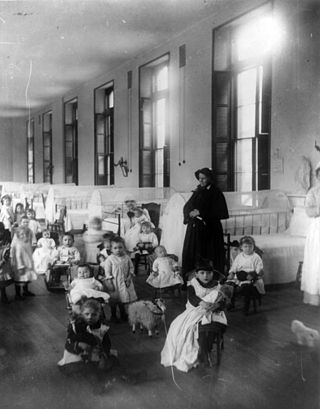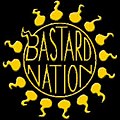
Adoption is a process whereby a person assumes the parenting of another, usually a child, from that person's biological or legal parent or parents. Legal adoptions permanently transfer all rights and responsibilities, along with filiation, from the biological parents to the adoptive parents.
A birth certificate is a vital record that documents the birth of a person. The term "birth certificate" can refer to either the original document certifying the circumstances of the birth or to a certified copy of or representation of the ensuing registration of that birth. Depending on the jurisdiction, a record of birth might or might not contain verification of the event by a healthcare professional such as a midwife or doctor.
The international adoption of South Korean children started around 1953 as a measure to take care of the large number of mixed children that became orphaned during and after the Korean War. It quickly evolved to include orphaned Korean children. Religious organizations in the United States, Australia, and many Western European nations slowly developed the apparatus that sustained international adoption as a socially integrated system.

A family reunion is an occasion when many members of an extended family congregate. Sometimes reunions are held regularly, for example on the same date of every year.
An adoption reunion registry is a formal mechanism where adoptees and their birth family members can be reunited. Registries may be free or charge fees, be facilitated by non-profit organizations, government agencies or private businesses.
Closed adoption is a process by which an infant is adopted by another family, and the record of the biological parent(s) is kept sealed. Often, the biological father is not recorded—even on the original birth certificate. An adoption of an older child who already knows their biological parent(s) cannot be made closed or secret. This used to be the most traditional and popular type of adoption, peaking in the decades of the post-World War II Baby Scoop Era. It still exists today, but it exists alongside the practice of open adoption. The sealed records effectively prevent the adoptee and the biological parents from finding, or even knowing anything about each other. However, the emergence of non-profit organizations and private companies to assist individuals with their sealed records has been effective in helping people who want to connect with biological relatives to do so.
In the United States, adoption is the process of creating a legal parent–child relationship between a child and a parent who was not automatically recognized as the child's parent at birth.
Open adoption is a form of adoption in which the biological and adoptive families have access to varying degrees of each other's personal information and have an option of contact. While open adoption is a relatively new phenomenon in the west, it has been a traditional practice in many Asian societies, especially in South Asia, for many centuries. In Hindu society, for example, it is relatively common for a childless couple to adopt the second or later son of the husband's brother when the childless couple has limited hope of producing their own child.
The Adoption Information Disclosure Act, formally An Act respecting the disclosure of information and records to adopted persons and birth parents, also known as Bill 183, is an Ontario (Canada) law regarding the disclosure of information between parties involved in adoptions.
The Adoption Disclosure Register (ADR) is an adoption reunion registry operated by the government of Ontario, Canada. It implements the adoption disclosure provisions of the Child and Family Services Act.
Ballot Measure 58 was a citizen's initiative that was passed by the voters of the U.S. state of Oregon in the November 1998 General Election. The measure restored the right of adopted adults who were born in Oregon to access their original birth certificates. The measure passed with 609,268 votes in favor, 454,122 against. It was immediately challenged by several birth mothers who had put children up for adoption, which delayed instituting the measure for a year and a half.
Sealed birth records refers to the practice of sealing the original birth certificate upon adoption or legitimation, often making a copy of the record unavailable except by court order. Upon finalization of the adoption, the original birth certificate is sealed and replaced with an amended birth certificate declaring the adoptee to be the child of his or her adoptive parents, "as if" born to them. Many states, provinces and countries adopted this practice in the early to mid-20th century with the aim of protecting the adopted person from the shame of an illegitimate birth. Sealed or closed birth records are generally associated with closed adoption. Open records is generally referred to as the practice of opening original birth records to adult adoptees, and should not be confused with open adoption, which can occur with or without sealed records, depending on the laws of the state or province in which it is carried out.

Missouri Constitutional Amendment 2 was a state constitutional amendment initiative that concerned stem cell research and human cloning. It allows any stem cell research and therapy in the U.S. state of Missouri that is legal under federal law, including somatic cell nuclear transfer to produce human embryos for stem cell production. It prohibits cloning or attempting to clone a human being, which is defined to mean "to implant in a uterus or attempt to implant in a uterus anything other than the product of fertilization of an egg of a human female by a sperm of a human male for the purpose of initiating a pregnancy that could result in the creation of a human fetus, or the birth of a human being". Commercials supporting and opposing the amendment aired during the 2006 World Series, in which the St. Louis Cardinals participated. The issue became especially intertwined with the 2006 U.S. Senate election in Missouri, with the Republican and Democratic candidates on opposite sides of the issue.
Adoption disclosure refers to the official release of information relating to the legal adoption of a child. Throughout much of the 20th century, many Western countries had legislation intended to prevent adoptees and adoptive families from knowing the identities of birth parents and vice versa. After a decline in the social stigma surrounding adoption, many Western countries changed laws to allow for the release of formerly secret birth information, usually with limitations.
The language of adoption is changing and evolving, and since the 1970s has been a controversial issue tied closely to adoption reform efforts. The controversy arises over the use of terms which, while designed to be more appealing or less offensive to some persons affected by adoption, may simultaneously cause offense or insult to others. This controversy illustrates the problems in adoption, as well as the fact that coining new words and phrases to describe ancient social practices will not necessarily alter the feelings and experiences of those affected by them. Two of the contrasting sets of terms are commonly referred to as positive adoption language (PAL), and honest adoption language (HAL).
The American Adoption Congress (AAC) was created in the late 1970s as an umbrella organization by the search and support, adoption reform groups sprouting up globally. Initiated by Orphan Voyage founder, Jean Paton, people representing many groups gathered in regions around the United States and began planning the incorporation. The first AAC Conference was held in Washington, DC in May 1979. The second was in Anaheim, CA in 1980, and the third at the TWA Training facility outside Kansas City in 1981, where it was reincorporated and gained 501(c)3 tax exempt status. Conferences have been held around the United States annually ever since.
The following outline is provided as an overview of and topical guide to adoption:
Concerned United Birthparents, Inc. (CUB), a non-profit organization established in 1976, is one of two primary nationwide organizations offering support to the biological parents of adopted people in the United States. The organization is credited with the creation of the term "birthparent."
There have been several high-profile cases of deportation of Korean adoptees from the United States. Prior to the passage of the Child Citizenship Act of 2000, the adoptive parents of adoptees had to file for their child to naturalize before the age of 16. Many parents were unaware of this requirement, assuming that their adopted children automatically derived citizenship from them, and therefore did not apply. The Child Citizenship Act sought to remedy this issue by extending citizenship to all international adoptees who were under 18 at the time that the bill was passed, but did not apply retroactively. This left those adopted by American families prior to 1983 vulnerable to deportations.



